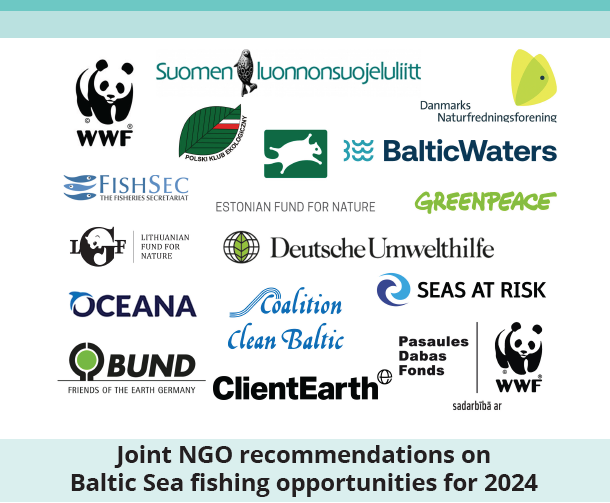Joint NGO recommendations on Baltic Sea fishing opportunities for 2024

June 2023 - The Baltic Sea ecosystem is in severe distress and the major commercial fish stocks have never been in worse condition. Both cod stocks are on the verge of collapse, all herring stocks are facing severe difficulties except the well managed Gulf of Riga herring, salmon is in decline and sprat has had low recruitment for two years in a row. Only the plaice spawning stock biomass is high, however alarming signals show a high number of small and skinny fish. In ICES’ own press release, the situation was summarised accordingly: “For a number of large commercial stocks, the advice does not make for positive reading.” and “The Baltic Sea faces many challenges, and conditions here have been deteriorating over the past decade. Overfishing and habitat destruction have impacted the biodiversity and ecological balance of the sea.[1]”
It is clear the current management system is not working.
We must have a management system in the Baltic Sea accounting not only for fisheries, but
acknowledging and protecting ecosystem functions. As of today, the Baltic Sea does not even have
mixed fishery advice. Considering the dire state of the Baltic and its fish, all sectors with an impact on the ecosystem must contribute to bringing the Baltic back to a healthy and productive state. In the case of the fisheries sector, this means adjusting fishing pressure to respect the limits of the system and minimising other impacts of fishing on the marine environment.
In October 2023, EU fisheries ministers will agree on fishing opportunities in the Baltic Sea for 2024. As the deadline to end overfishing by 2020 at the latest as legally prescribed by Article 2(2) of the Common Fisheries Policy (CFP)2 has passed, all fishing limits must be in line with sustainable exploitation rates.

Summary of NGO recommendations
The following text outlines the joint NGO recommendations on Baltic Sea fishing opportunities for 2024 in the context of environmental regulations, EU fisheries legislation, scientific advice on catch limits, and the sharing of stocks with third countries.
Overall, we urge the European Commission to propose, and fisheries ministers to adopt, fishing opportunities in accordance with the following recommendations:
- Set TACs not exceeding the best available scientific advice provided by the International Council for the Exploration of the Sea (ICES), both for stocks with advice based on the ICES MSY approach (where MSY-based reference points are available) and for stocks with advice based on the ICES precautionary approach for data-limited stocks.
- In light of the dire situation of the Baltic Sea ecosystem including many of its fish stocks, set
TACs sufficiently below the relevant ICES headline advice presented at the top of the respective ICES single-stock advice document, and ensure that these limits are respected, in order to prioritise the protection and recovery of depleted stocks and to factor in additional anthropogenic pressures and ecosystem dynamics.
Additionally, we call for improved transparency of negotiations and decisions as follows:
- Provide transparent calculations for TACs based on the ICES advice on fishing opportunities;
- Improve transparency by making publicly available any proposals subsequent to the official
Commission proposal, including Commission non-papers as well as Council Working Party,
AGRIFISH Council, and BALTFISH documents and minutes.
Finally, the European Parliament, as a co-legislator of the CFP basic regulation and of the Baltic Sea
MAP, should be vigilant that no infringements of the rules for which it is responsible occur, and that the overarching objective of rebuilding EU fish stocks to healthy levels is fully achieved.
Download the full joint NGO recommendations on Baltic Sea fishing opportunities for 2024 here.
CONTACT
Nils Höglund, CCB Fisheries Policy Officer: nils.hoglund (at) ccb.se


